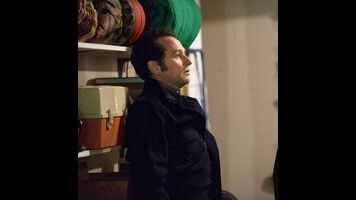Americans values: Spy, lie, die, destroy everything else on TV

From the very beginning, The Americans has always treated its high-stakes premise—Russian spies infiltrating American life from the inside—as a microcosm for broader thematic concerns. However entertaining the espionage and the political intrigue is on the surface, showrunners Joe Weisberg and Joel Fields’ interests lie in how spy craft can explore the discomfiting truths that rule our daily lives: The limitations of trust and vulnerability in close relationships; how deception can be an organizing principle for any outsider; the parental fear of passing burdens to your children; and love as a beautiful, yet dangerous, force in the world.
But if there’s one potent idea that the series returns to again and again, it’s how a person’s commitment to a set of values can eventually compromise the foundation of their life. For some, these values may be greed or professional success, but for Elizabeth and Philip Jennings (Keri Russell and Matthew Rhys), it’s their loyalty to the Soviet Union, and how their nationalist fervor has irreparably corroded not only the state of their own family, but their souls as well.
The Americans’ stellar fourth season squarely focuses on the damage the Jennings have wrought by continuing in their line of work. Their daughter Paige (the excellent Holly Taylor) shakes with fear after learning her parents’ true identities, eventually sharing her secret with Pastor Tim (Kelly AuCoin) and forcing her family to deal with the fallout. Informant Martha (Alison Wright) gets drawn more and more into a complex web of lies after learning that her husband “Clark” was the one who orchestrated her co-worker Gene’s suicide. Handler Gabriel (Frank Langella) begins to express his own doubts about the Jennings’ position in America, doubts not shared by the omnipresent Centre that apparently holds all the cards. Meanwhile, sad sack FBI agent Stan Beeman (Noah Emmerich) turns his sights on people within his own department, Oleg and Arkady (Costa Ronin and Lev Gorn) are being kept out of the loop in the Rezidentura, and Nina (Annet Mehendru) continues to sabotage her own safety to help those close to her. While the third season opened up new dramatic avenues by bringing Paige closer and closer to the truth, Weisberg, Fields, and company are slowly breaking apart the foundation of the series with this season, examining the long-term consequences of our “heroes’” actions.
If there’s one character who receives the lion’s share of the attention in the early part of the season, it’s Philip, whose own serious reservations about his job begin to bubble up to the surface yet again. While Elizabeth has always had a bedrock loyalty to her country and her mission, Philip has harbored doubts since the beginning of the series, expressing distress about the violence he commits and how his lies will impact his children. But now, he’s having nightmares about past murders, second-guessing himself on missions, and turning to EST, a painfully earnest self-help seminar, to cope with his guilt. When Gabriel introduces the threat of biochemical pathogens into their lives, Philip wants to run away more than ever, but also recognizes that fantasizing about escaping to Russia is much easier than actually uprooting his family, something that Elizabeth immediately recognizes, despite her deep commitment to the cause.
While the narrative twists and turns with every new revelation and compounded lie, the series’ phenomenal visual schema remains remarkably consistent. Simply put, The Americans is one of the very best directed, photographed, and edited shows on television, and the fourth season features some of its best setpieces to date. Though the series frequently relies on visual storytelling to move the plot forward, what’s more impressive is how the camera deftly adopts different modes to best capture the needs of any given episode, whether it’s subtleties of the actors’ performance, the quiet suspense of voyeurism, or the jarring violence that occasionally invades the frame like a virus. Alex Nepomniaschy’s muted photography renders Washington, D.C. as gray as Soviet Russia, subtly calling attention to the moral shortcuts that both countries routinely make, and neatly highlighting the shadows in which Elizabeth and Philip live. A visual and aural delight (watch out for the series’ stunning use of Soft Cell’s “Tainted Love” in a brutal murder scene), The Americans frequently showcases the sizable talent behind the camera, and never leans on the complexity of the series’ writing to make a point that the camera can do just as easily.
If the fourth season reminds viewers of anything, it’s that The Americans has a masterful control of tone, doling out horror and slow-burn dread like very few of its contemporaries. Though the series excels at introducing standalone elements in each season, primarily in Elizabeth and Philip’s missions, it nevertheless has a very long memory, using serialization to capture the effect of watching a car crash in slow motion. Weisberg and Fields never let the audience forget that all of the characters’ choices will eventually come back to haunt them: The guiding principles we adopt are often what causes our own undoing, whether it’s Martha’s love for her husband, or Nina’s empathy for the broken men in her life, or Philip and Elizabeth’s oath to a country that will soon no longer exists. But Weisberg also understands that people need principles to give their lives meaning, no matter how shortsighted they may be. When Arkady informs Oleg that his brother was recently killed in combat, a heartbroken Oleg mutters that his brother’s tour was up months ago, knowing full well that it was his loyalty that ultimately brought him down. The Americans lives and dies in that moment of fractured, conflicted recognition, knowing that the things we do to survive are never as sustainable as we’d like to believe.